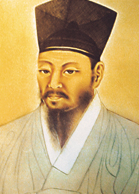Catholic Reformist
in Joseon Dynasty
Jeong Yak-yong attempts to reform ancient kingdom,
but fails due to conservative opposition
 Jeong Yak-yong(1792-1836) with a penname of Dasan was a revered scholar during the Joseon Dynasty(1392-1910) who tried to solve many problems in his time.
Jeong Yak-yong(1792-1836) with a penname of Dasan was a revered scholar during the Joseon Dynasty(1392-1910) who tried to solve many problems in his time.
When signs appeared that the dynasty would no longer be able to sustain itself, he envisioned a new country, leaving behind both failures and academic achievements of the dynasty.
He was too honest and ambitious in academic pursuit.
When he was still young man, he was chosen to serve King Jeongjo, the ruling monarch at the time of Joseon Dynasty. He thought of making social reform, but the conservative Old Doctrine(Noron) faction opposed Jeong's reform effort with an excuse that Jeong was a Catholic, harassing him politically. With king Jeongjo's death, Dasan was sent to exile and the kingdom faced suffering and pain.
The ancient scholar wrote many masterpieces during his exile in the countryside. The writings dealt mostly with his envisioned reform that he never saw realized and like many other scholars, he succeeded in his ideology over politics
Dasan, in his writings, called for modernization of the country, but his idea of modernity was far different from that of West with its industrial revolution, technological enlightenment and popular elections. His modernity was of ideology and discourse essentially making up his designs for modernization.
The two new thoughts appeared in Dasan's philosophy. The first was "new social ideology.Dasan expressed these two thoughts in the study of Chinese classics and the study of government.
Dasan's lifetime work was reforming the Joseon Dynasty influenced by Chinese Confucian scholar Chu Hsi. His reforms of Chu Hsi's teachings were expressed in his study of the Chinese classics, and his reform of Joseon was expressed in his ideas on government.
If his study of the Chinese classics can be called a philosophical criticism of those in power at the time,
 then his ideas on government were a blueprint for reform for the creation of a new Joseon.
then his ideas on government were a blueprint for reform for the creation of a new Joseon.
The most radical of Dasan's ideas on government were the political idea that the people should choose a king for themselves and the economic idea that farmers should be responsible for and cultivate their own land, and that a fixed portion of their harvest should be offered in taxes.
Dasan's ideas on government basically aimed at farmers' participation in government. He was far ahead of his time and on the foundation of this thought was erected a new view of humanity.
Dasan's study of the Chinese classics shows us the process of going from the abstract to the concrete. Dasan tried to bring those concepts that had been abstracted by Chu Hsi's Confucianism back to the level of concrete, simple and empirical ideas. In Western philosophy, this is similar to John Locke's criticism of Thomas Aquinas.
In his criticism, one can see that modern humans are beings with wills, desires and sensitivities. Essentially, one can see a change in the perception of humanity from a mere brick in the ontological and social pyramid to subjects with individuality, humans of flesh and blood. This is Dasan's ideology one can hear the trumpets that proclaim the birth of the "subject."Dasan's concept of the subject, though, was not a Western subject that composed the community through the certainty of the self, autonomous individuality and a social contract. Dasan's subject was a moral being that transcended the egoism of the individual. Yet Korean history did not follow the way Dasan had charted. This is because Korea took the road of Westernization to modernization. As a result, Dasan's thoughts remained a solitary struggle on the banks of history while stream followed another course.
nw
An ancient hoist invented by Jeong
Jeong Yak-yong
3Fl, 292-47, Shindang 6-dong, Chung-gu, Seoul, Korea 100-456
Tel : 82-2-2235-6114 / Fax : 82-2-2235-0799